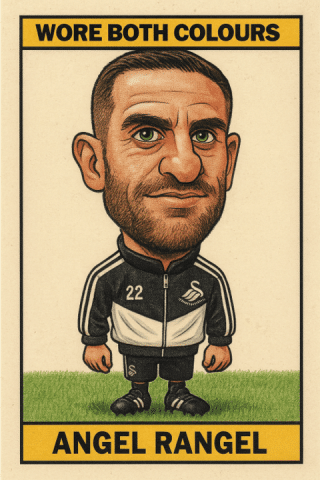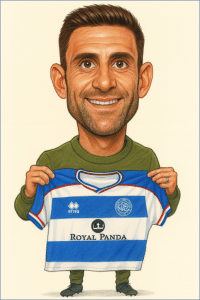The latest chapter in our “Wore Both Colours” series arrives with a fixture that always stirs memories and narratives: Swansea City versus Queens Park Rangers. Two clubs with distinct identities, yet a surprising number of shared threads. As the Swans prepare to face the Rs once again, we turn our spotlight to a player who wore both shirts with pride, each at a very different stage of his career.
Àngel Rangel is the name on our lips this week. A true Swansea City icon, Rangel’s journey from the lower leagues of Spanish football to the heights of the Premier League is etched into the club’s modern folklore. For over a decade, he patrolled the right flank at the Liberty Stadium, embodying the club’s rise with quiet authority and technical brilliance. After his long and storied spell in South Wales, Rangel found himself in West London, donning the blue and white hoops of QPR for two seasons before hanging up his boots.
This is the story of a man who didn’t just wear both colours. He left a legacy in one and added a final chapter in the other. From Catalonia to SA1, and finally to Loftus Road, Rangel’s career is a tale of loyalty, evolution, and understated excellence.
🌱 The Early Days
Àngel Rangel was born on 28 November 1982 in Sant Carles de la Ràpita, a coastal town in Catalonia. His footballing journey began far from the glamour of top-flight stadiums. He started out in the lower tiers of Spanish football, playing for CD Tortosa, CF Reus Deportiu, and UE Figueres. These early years were shaped by grit and persistence, with Rangel honing his craft in the Segunda División B and Tercera División.
His most significant pre-Swansea spell came at Terrassa FC, where he made over 100 appearances between 2003 and 2007. It was here that Rangel began to attract attention beyond Spain’s regional leagues. Known for his composure on the ball and intelligent positioning, he stood out in a side that often struggled for consistency. Despite his performances, few would have predicted the leap he was about to make.
In the summer of 2007, Roberto Martínez, then Swansea City manager and a fellow Catalan, brought Rangel to South Wales for a reported fee of just £10,000. It was a modest transfer, almost overlooked at the time, but it would prove to be one of the most astute pieces of business in the club’s history. Rangel arrived with no fanfare, no headlines, and no expectation. What followed was a decade of excellence.
🏟️ Swansea City: The Making of a Legend
Àngel Rangel didn’t take long to make his mark in South Wales. Within weeks of arriving, he had claimed the right-back slot as his own, combining technical finesse with a calmness that belied his modest footballing background. His debut season was a triumph. He played 52 times, scored twice, and helped Swansea clinch the League One title. His performances earned him a place in the PFA Team of the Year, alongside club stalwarts like Garry Monk and Ferrie Bodde.
own, combining technical finesse with a calmness that belied his modest footballing background. His debut season was a triumph. He played 52 times, scored twice, and helped Swansea clinch the League One title. His performances earned him a place in the PFA Team of the Year, alongside club stalwarts like Garry Monk and Ferrie Bodde.
As the club climbed into the Championship, Rangel remained a constant. His intelligent positioning, sharp passing, and ability to read the game made him a perfect fit for the Swansea Way, a possession-based style that became the club’s identity under Roberto Martínez, Brendan Rodgers, and Michael Laudrup. Rangel’s consistency was remarkable. He made over 40 appearances in each of the next three seasons, culminating in the club’s historic promotion to the Premier League in 2011.
In the top flight, Rangel didn’t just survive. He thrived. He played 35 times in Swansea’s debut Premier League campaign, helping the club finish 11th and earning widespread praise for his composure and adaptability. He scored his first Premier League goal in a 3–0 win over West Ham in August 2012 and played a key role in Swansea’s 2013 League Cup triumph, starting in the 5–0 final win over Bradford City at Wembley.
One of his most surreal moments came in November 2013, when he briefly played in goal against Cardiff City after Michel Vorm was sent off and all substitutions had been used. It was a cameo that summed up Rangel’s commitment and versatility.
Over 11 seasons, Rangel made 328 league appearances for Swansea and 374 in all competitions. He became club captain, a fan favourite, and a symbol of the club’s rise from League One obscurity to European nights. His journey mirrored Swansea’s own transformation, and his legacy remains etched into the fabric of the Liberty Stadium (Swansea.com Stadium!)
🏟️ QPR: Life After Swansea
After eleven seasons in South Wales, Àngel Rangel’s time at Swansea came to an end in the summer of 2018. At 35 years old, he was released by the club, bringing the curtain down on a decade of service that had taken him from League One to the Premier League and into Europe. But Rangel wasn’t finished yet.
Just weeks later, he signed a one-year deal with Queens Park Rangers, joining Steve McClaren’s squad in the Championship. It was a move that surprised some, but Rangel quickly proved he still had plenty to offer. He made 21 league appearances in his first season at Loftus Road, starting every match he featured in and providing a steadying influence in a young and transitional side.
His performances earned him a contract extension, and he remained with QPR for the 2019–20 season. Although injuries limited his involvement, he still managed another 21 league appearances, bringing his total to 42 for the club. While he didn’t score or register assists, his role was never about numbers. Rangel brought experience, professionalism, and calm to a squad that needed it.
He wore the number 22 shirt and was often praised for his leadership and mentoring of younger players. Though his time in West London didn’t carry the same weight as his Swansea years, it was a fitting final chapter. A veteran defender helping guide the next generation before quietly stepping away from the game.
🧢 Life After Retirement
Àngel Rangel officially retired from professional football in April 2021 at the age of 38. His decision came after a conversation with his youngest son, who told him he missed him and wanted him home. That moment, Rangel later said, made him realise it was time to step away from the game and prioritise family life.
Since retiring, Rangel has stayed close to the sport. He now coaches the under-12 team at Pontardawe Town, a grassroots club in South Wales. It’s a quiet but meaningful return to the game, allowing him to pass on his experience to the next generation while staying rooted in the community that embraced him for more than a decade.
Rangel has also expressed interest in pursuing his coaching badges, with the long-term goal of stepping into management. He remains a passionate supporter of Swansea City and still watches their matches regularly. His connection to the club runs deep, and he’s spoken openly about wanting to give back to the game that shaped his life.
For now, his focus is on family, coaching, and staying healthy. After a career built on consistency and quiet leadership, Rangel’s post-playing chapter reflects the same values. Grounded, thoughtful, and still quietly influential.
Àngel Rangel’s career is a study in quiet excellence. He didn’t chase headlines or stir controversy. He built his reputation through consistency, intelligence, and a deep understanding of the game. From the lower leagues of Catalonia to the Premier League spotlight, and finally to a mentoring role at QPR, his journey was defined by substance over spectacle.
Few players embody the spirit of a club the way Rangel did at Swansea. He arrived without fanfare and left as a captain, a cup winner, and a symbol of the club’s rise. His time at QPR may have been shorter and less decorated, but it showed the same qualities — professionalism, humility, and a willingness to lead.
Now retired, Rangel continues to give back to the game, coaching young players and staying rooted in the community that embraced him. His legacy isn’t just in the matches he played or the trophies he lifted. It’s in the way he carried himself, the standards he set, and the respect he earned.
In a fixture that brings together two clubs he served, Rangel stands as a reminder that greatness isn’t always loud. Sometimes it is measured in quiet moments, steady leadership, and the trust of teammates who knew he would never let them down.
This article first appeared on JACKARMY.net.

